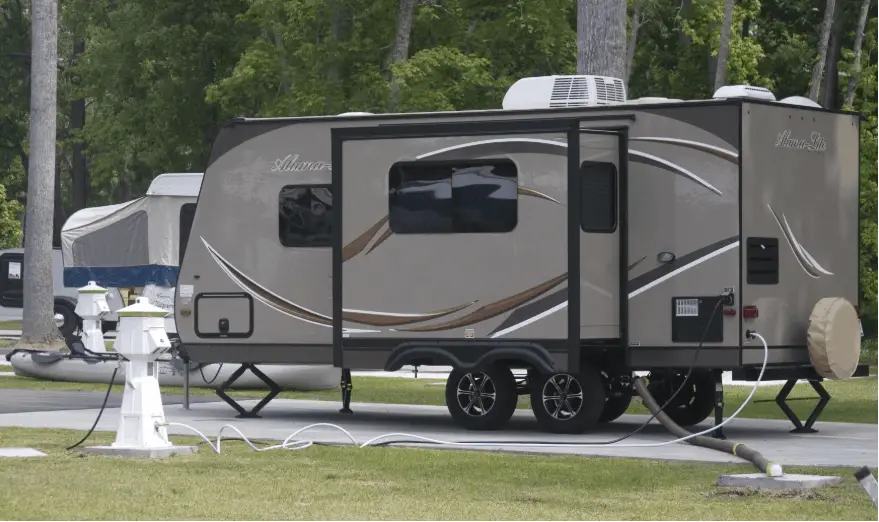Travel trailer weight is a significant parameter if you are about to buy either a new or used one. So, how much do travel trailers weigh normally? This is an important thing to know if you want to know all options for your car or truck.
The weight of trailer camper is generally mentioned by the manufacturer, but they also mention many other ratings which should not be overlooked.
A trailer weight is not only the weight it carries when build, but will also include all other things you pack in.
Their weight depends on length, and many other factors. Lets see some examples and draw conclusion on the weights of travel trailers or campers.
How much do travel trailer weigh on an average
Many people buy travel trailer due to their cost and size. A travel trailer is very popular option in rv’s. One question that many people often have is how much do the travel trailers weigh.
Travel trailer weight varies widely and on an average it is between 1000 lbs to 8800 lbs.
Most of the popular travel trailer have lengths between 15 feet to 35 feet.
Comparing several travel trailers and their wights below is the average weight of travel trailer for different lengths.
| Travel Trailer Length | Average Weight |
|---|---|
| 10 – 12 feet | 1250 to 1300 lbs |
| 14 – 15 feet | 1500 to 1650 lbs |
| 16 – 18 feet | 2200 to 2300 lbs |
| 18 – 22 feet | 2500 to 2750 lbs |
| 24 – 26 feet | 3600 to 4100 lbs |
| 28 – 30 feet | 4300 to 4900 lbs |
| 32 – 38 feet | 7200 to 8500 lbs |
The weight of travel trailer depends on the size or length. When understating the weight parameters in pounds there are multiple thing that you should understand rather then just going by the weight called out by the dealer in manual.
In this post, we will see average weight of travel trailers and various other terminologies related to travel trailer weight.
Understanding the weigh of a travel trailer is important because you are supposed to pull it using a car or suv.
A car will have certain limit and if your trailer exceeds that limit then that could be a problem. Towing a trailer initially can be tough but following the tips that i gave in my previous article can make it super easy, do check it out.
When you head out for camping, you end up packing lots of things and with a full gas tank plus a full water tank, will mean lots of weight. Thus, it becomes more important that you have fair idea of where the weight is heading. Apart from understanding the dry weight of travel trailer, get a fair idea of other weights related to it.
In case, you want to know how to find dry weight, do check linked detailed guide.
A hitch should also be good enough to handle the overall weight. Also, with a rv, you are supposed to follow certain rules related to weight. Once you cross certain weight limit even the drivers license requirement change in some states.
Read : 17 Tips to reduce RV Weight
One thing many people try to check is if they can find smaller travel trailer that have less weight. A smaller less weight travel trailer lets you pull it easily.
We will also see how travel trailer weight varies by length. Once you have that idea, it can be helpful to determine the approximate weight based on length.
Travel trailer weight variation on the basis of length
Main reason why people want to know about the weight of their travel trailer is to determine if their car or truck can tow the trailer or not. A travel trailer has length that ranges from 17 feet to 40 feet.
More the length, more is the weight of travel trailer. A 15-18 feet travel trailer will obviously weigh less than a 30 feet one. That is to say, we can almost say that weight of the travel trailer is proportional to its length. This however, may not be always be correct as with new models, construction type material the weight is varies.
New year models released and built are less heavy and thus, we can also say weight is inversely proportional to year make of the travel trailer. On an average a 16 feet length travel trailer will have a unloaded weight of around 2200 lbs to around 3400 lbs. A 30 feet travel trailer can weigh around 7000 lbs to 7800 lbs.
This may however, be not true for all makes and brands, it will always vary. But, on an average you will find the numbers to be very close. A 20 feet travel trailer can be as heavy as 2700 lbs to 2900 lbs. With advances in the way travel trailers are manufactured, you will also find a 15 feet travel trailer weighing just above 1500 lbs unloaded or even an 13 feet long travel trailer weighing below 1200 pounds.
Travel trailer are smaller rv’s, they sleep 2-3 people at times and can also be lengthy about 40 feet long. A travel trailer weight also depends on the floor plan, kind of dinner built in, position of the bath, kitchen positioning, entry exit doors, window positioning, bed style (this things require changes, adjustments then lead to weight variations).
How much do small travel trailers weigh
Lets see some examples of travel trailers along with their weight and length. This should give a fair idea of relation between length and weight of a travel trailer. These are some of the smaller travel trailer that are popular under the weight of 4000 pounds.
- Forest River Flagstaff E-Pro 12RK – 11 feet long and weighs around 1150 lbs
- ALiner Ascape camp travel trailer – 13 feet long and weighs around 1495 lbs
- Forest River Flagstaff E-Pro 14FK – 14 feet long and weighs around 2010 lbs
- ALiner Ascape plus travel trailer – 13 feet long and weighs around 1150 lbs
- KZ Sportsmen Classic 130RB travel trailer – 15 feet long and weighs around 2126 lbs
- ALiner Ascape MT travel trailer – 13 feet long and weighs around 1170 lbs
- ALiner Ascape ST travel trailer – 13 feet long and weighs around 1575 lbs
- Forest River Flagstaff E-Pro 16BH – 18 feet long and weighs around 2870 lbs
- KZ Sportsmen Classic 150BH travel trailer – 17 feet long and weighs around 2260 lbs
- Forest River Flagstaff E-Pro 17PR – 20 feet long and weighs around 3160 lbs
- KZ Sportsmen Classic 151RB travel trailer – 18 feet long and weighs around 2530 lbs
- Forest River Flagstaff E-Pro 17RK – 20 feet long and weighs around 2930 lbs
- KZ Sportsmen Classic 180BH travel trailer – 20 feet long and weighs around 2620 lbs
- Forest River Flagstaff E-Pro 19FBS – 20 feet long and weighs around 2960 lbs
- Jayco Hummingbird 16FD travel trailer – 18 feet long and weighs around 2535 lbs
- KZ Sportsmen Classic 160QB travel trailer – 22 feet long and weighs around 2740 lbs
- Jayco Hummingbird 16MRB travel trailer – 19 feet long and weighs around 2780 lbs
- Forest River Flagstaff E-Pro 19FD – 20 feet long and weighs around 2825 lbs
- Jayco Hummingbird 17BH travel trailer – 19 feet long and weighs around 3015 lbs
We can determine a fair idea of weight based on travel trailer length. But that may not be always true. A length cannot be the ultimate decider to figure out the exact weight of a travel trailer, as seen from examples a 20 feet long travel trailer (of not only different make, but even same brand) weighs differently. Thus, it also depends on the floor plan, amenities and many other things packaged in the trailer.
How much do longer travel trailers Weigh
As we already saw a longer travel trailer will weigh much more and it is almost proportional to its length. A 40 feet travel trailer will have enough weight to make you think if the car you have, is good enough to pull it or not.
Even a 25 feet or 30 feet long travel trailer is much heavier and you need to be sure about the capacity of your pulling car. Lets see some of the examples to understand better and draw some conclusion on length-weight relation for heavier travel trailers.
Examples here in are also some of the best travel trailers you could buy in the range of 28 feet and 30 feet with weights under 5000 pounds and so on. While some are quoted just to see how the best and average travel trailers weigh in different segments of lengths.
- Keystone RV Passport 175BH Express travel trailer – 22 feet long and weighs around 3250 lbs
- Keystone RV Passport 195RB Express travel trailer – 23 feet long and weighs around 3805 lbs
- Forest River RV Flagstaff Classic Super Lite 831CLBSS travel trailer – 35 feet long and weighs around 8105 lbs
- Forest River RV Flagstaff Classic Super Lite 832FLBS travel trailer – 35 feet long and weighs around 8621 lbs
- Keystone RV Passport 195RBWE Express travel trailer – 23 feet long and weighs around 3812 lbs
- Keystone RV Passport 2200RBWE Grand travel trailer – 25 feet long and weighs around 3805 lbs
- Forest River RV Flagstaff Classic Super Lite 831BHDS travel trailer – 34 feet long and weighs around 7970 lbs
- Forest River RV Flagstaff Classic Super Lite 31BHWSS travel trailer – 34 feet long and weighs around 8386 lbs
- Keystone RV Passport 234QBWE Express travel trailer – 25 feet long and weighs around 3870 lbs
- Keystone RV Passport 239ML Express travel trailer – 25 feet long and weighs around 4140 lbs
- Prime Time RV LaCrosse 2911RB travel trailer – 31 feet long and weighs around 6516 lbs
- Prime Time RV LaCrosse 318BHS travel trailer – 36 feet long and weighs around 8022 lbs
- Keystone RV Passport 2400BH Grand Touring travel trailer – 28 feet long and weighs around 4840 lbs
- Keystone RV Passport 2670BH Grand Touring travel trailer – 30 feet long and weighs around 5344 lbs
- Prime Time RV LaCrosse 324RST travel trailer – 37 feet long and weighs around 8334 lbs
- Prime Time RV LaCrosse 329BHT travel trailer – 37 feet long and weighs around 8815 lbs
From the examples we could see that a 26 feet long travel trailer on an average weighs around 3800 lbs to 4150 lbs. A 28 feet long travel trailer weighs in the range of 4300 lbs – 4900 lbs. A travel trailer between the length of 32 feet to 38 feet weighs 7200 lbs – 8500 lbs.
This should be enough to paint a fair idea of how a length of travel trailer is related to its weight. But, the weights are unloaded weights and should not be confused with the overall weight of travel trailers
Understanding the travel trailer weight terminology
A travel trailer weight or weight of any other rv need to be understood correctly. The numbers that you get from the manufacturer or dealer could be misleading and misunderstood.
The weight details of various sized travel trailers that we saw are the unloaded weights. You basically need to do the math properly to see if the travel trailer weight is within limits for your car to pull.
Weight understanding in case of travel trailer is much more important than motorhomes which drives themselves (which is not the case for travel trailer or fifth wheel or pop up campers or any other towable trailers). Its important you understand the rv weight terminology.
A rating provided by manufacturer cannot be changed. Normally weight and load are same when you talk weight of rv’s. Basically, a weight of rv puts load on rv tires, axles and hitches.
This load is used to calculate various rating like GAWR (gross axle weight Rating), GCWR (gross combination weight Rating), GVWR (gross vehicle weight Rating). Lets, try to understand what exactly these things mean and how you should interpret values for these.
Gross Axle Weight Rating (GAWR) – This rating basically is the maximum load that the axle of the trailer can support. Trailer manufacturer provides this rating and it basically depends on axle, tire, wheels and the rating is based on the weakest link.
Unloaded Vehicle Weight (UVW) – This is the weight of the RV or travel trailer when it is fully unloaded without any extra things on it. Usually the weight that you see when it is at the dealer and not yet sold.
The weights that we saw above were unloaded weights. Most times people are confused with this weight, and assume the unloaded weight as the final towing weight. But, in reality the weight increases when you actually pull the trailer with all the things packed in.
Gross Vehicle Weight Rating (GVWR) – This rating means the maximum weight that is allowed on the RV including all the things like the passengers, driver, water, fuel. The trailer and the towing vehicle will both have their own GVWR.
Gross combination Weight rating (GCWR) – Unlike GVWR, the GCWR is the combination rating for both the trailer and the towing vehicle. It gives the maximum combined limit for the tow vehicle and the travel trailer.
Cargo carrying capacity (CCCC) – This basically means the weight of the trailer without the optional accessories, equipment in the trailer.
Net carrying capacity (NCC) – This is the weight of all own or personal things included on the trailer or rv. For example, the combined weight of fuel, water, food, gas, equipment tools etc
Sleeping Capacity weight rating (SCWR) – This basically gives the maximum weight limit depending on the number of sleeping positions designated by manufacturer. Each included person is assumed to be around 154 lbs and thus, a 2 sleeping travel trailer will mean its SCWR will be 208 lbs and so on.
Importance of Weight distribution in travel trailer
In case of travel trailer, the weight distribution is significant. An un-even weight distributed can be dangerous and the towing hitch and the trailer can be impacted.
You need to make sure the overall weight is properly distributed. The idea is to make sure weight is properly distributed along all sides, front to back and from both right and left sides.
Rv’s and travel trailer are originally designed with proper weight distribution, and when you tow the travel trailer you need to follow same when putting in more weight through other things.
The weight of both the tow vehicle and travel trailer should be properly distributed. Technically speaking, you also need to make sure the Gross Vehicle weight Rating and gross combined vehicle weight rating is not crossed at any time.
To understand the proper rules of weight distribution, you can read the manufacturer provided manual for your travel trailer or camper.
In most cases, the idea is to keep 60% of the weight ahead of the center of gravity of the travel trailer. To understand the correct weights of your travel trailer, its better to weigh it after it is fully loaded with all stuff.
An uneven distributed weight is notable with naked eyes, but may not always be visible hence its better to keep the weight within limits and properly distributed.
One can also use weight distribution systems to make it properly distributed. Weight distribution systems work using spring bars which correct uneven weight distribution.
What affects Weight of travel trailer – which things put on extra weight
Lets try to understand how the weight of the travel trailer is affected. What all things put on that weight.? An unloaded weight will be less but when you head out finally, the weight of the overall travel trailer could go out of limits and that’s what we should try to limit.
Water – Camping need lots of water. And water adds weight to your travel trailer ? yes, do not underestimate the power of water weight. It weighs almost 8 lbs per gallon. A 50 gallon water in a travel trailer will mean you already have put on 400 lbs extra on travel trailer.
Generator – A generator is a necessary thing in you rv. You get portable generators that weigh less but even then, they can be best weighted at 300-400 lbs and that is much to add to the limited capacity travel trailer.
More watts will generally mean more weight for the generator. Thus, getting the right size generator can be a wise thing to do. But, it may not be a simple calculation for many of us and that’s why i wrote this detail guide on how to choose the right size generator for your RV (You AC is mostly the deciding factor, check out how!)
Construction material affects weight – A travel trailer construction material type is also responsible for its weight. A fiberglass made trailer generally weigh less as compared to aluminum ones.
This however, should not be your problem as this will be included in the unloaded weight which is not in your hands anyways. But, understanding the material type of your travel trailer can be helpful as choosing the right one will mean your travel trailers unloaded weight itself is less.
Slide outs Increase weight – A slide out for your rv increases the overall weight. Its extra space but extra weight too. A slide out normally adds upto 1000 lbs on an average. Pop up are less heavy and that can be a good option as compared to slide outs if you are looking to reduce the overall weight on your travel trailer.
Read : Weight Holding capacity of Slide Out in RV
How to reduce weight on your travel trailer – tips to stay light
Weighing your rv often is the best thing you could do (in case you are confused on how to weigh your rv, here is a article that i posted about it). Regularly checking the weight helps to plan and you will stay within the rating limits. Lets see some of the things you could follow to reduce the weight and stay in limits
1. Get rid of extra things on your rv. Extra tools, extra equipment, unused personal belongings like shoes, clothes, books etc. Unused kitchen items, bedroom, bathroom accessories you don’t use more often should be kept out. All smaller things add up to put on those pounds which add-on to become a big number.
2. Weigh the travel trailer separately with car and without car. This gives great picture of what is happening and where the weight is distributed.
3. Get good weight distribution system to make sure weight is properly distributed.
4. While heading out for camping make sure you pack things which are absolutely needed and do not pack out of limits
5. Have only number of people allowed as per manufacturer manual. A human weight of around 150 lbs can be more than enough to cause the imbalance of weight distribution
6. Make sure tires are properly inflated. Maintain correct tire pressure for both travel trailer and car at all times.
7. Use aluminum in case you want to do any repairs or modifications to your travel trailer. Aluminium is light weight and thus will not put on extra weight on your travel trailer. Many times, people do patch work like filling in holes, cracks or structural changes to the travel trailer. All these smaller things should be done with materials that are less in weight and should not add on weights.
8. Get rid of things that are not in use for months or have become old. A ladder that you hardly need, an awning that is broken or things like kayak that you occasionally need. Remove things that you don’t use often or things of past that need replacement, just go ahead and replace them. This will not only save space but also reduce the unnecessary weight.
9. Get the sliding doors replaced with curtains. Doors that aren’t used for privacy and are in place just, can be removed and replaced with curtains or any other such fabrics used instead of heavy doors.
10. Replace old heavy things with new lightweight ones. Drawers, bins, shelving that are heavy and old, could be putting in weight unnecessarily and you should try and get things that are new and less in weight. You will find lots of innovative products specially designed for RV that are compact and lightweight.
Travel trailer weight comparison with Other Rv’s (Class C RV and class A RV)
A mini motorhome or a class C rv on an average weighs around 10,000 lbs to 14,000 lbs. That is almost double than an average weight of a travel trailer.
Class C motorhome are also longer than travel trailers, they tend to be around 18 feet – 30 feet long. Class A motorhomes on the other hand are the heaviest ones, they weigh much more.
On an average class A rv’s weighs anything between 15,000 lbs to 30,000 lbs. They are really heavy, and much more than a travel trailer. With so much weight they tend to intimidate you on road. Remember, with weight also the license requirement changes.
Read : How much weight RVs roof are capable to support
There is limit on weight up-to which you can drive using normal non commercial license but if the weight goes beyond certain limit then you need special license.
The rule of weight is different for all states. Like in California, a weight more than 26,000 lbs for a non towable RV will need a class B Non commercial license. Most states have similar requirement but could be little different for some states (need to check with each states rules and regulations).
A travel trailer to be towed has a weight limitation of around 10,000 lbs in most states and beyond that you will need class B Non commercial license. Looking at these numbers of pound for travel trailer, most of the times you will be okay with the normal license unless you have that very big trailer weighing more than 10,000 lbs.
If you are ready to tow your travel trailer and start the RV adventure then do start by getting all the essentials for your trailer (this is a complete list that you will need)
Conclusion
A travel trailer weight measurement is of much importance since it has the power to affect many other things in the camper trailer.
Apart from getting to know just the unloaded weight of the trailer, knowing all the other ratings help in towing car-trailer system smooth. A travel trailer weighs less as compared to other bigger rv’s however it is more important to know the weight in case of travel trailers. A travel trailer weight unloaded should not be your only way of judging the capacity of your car to tow.
Understanding overall weight when fully loaded and with full water/fuel tanks is more necessary. Going through manufacturer manual, weighing your trailer often are best practices to follow.
Keeping the travel trailer as light as possible can come good for your towing car or suv. Keeping the weight distribution proper is also important and proper hitches or distribution system can come handy. One should fully understand the towing capacity of the car and then manage the weight on travel trailer. Owning a very heavy trailer also needs special license requirements and thus better to make sure the weight is within limits.





